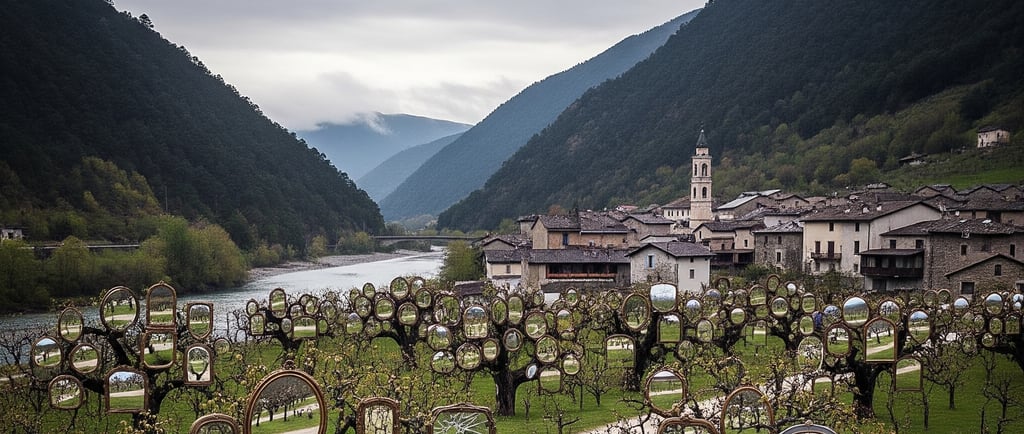Making the Two into One
Jesus said to them, "When you make the two into one, and make the inner like the outer and the outer like the inner, and the upper like the lower, and so make the male and the female a single one… then you'll enter the kingdom."
Alan Dyer
7/13/20253 min read


The Mirror Orchard
Making the Two into One
(Inspired by the Gospel of Thomas, Saying 22, with echoes of Matthew 18 and Galatians 3)
Opening Scripture
Gospel of Thomas, Saying 22:
Jesus saw some little children nursing. He said to his disciples, "These nursing children can be compared to those who enter the kingdom."
They said to him, "Then we'll enter the kingdom as little children?"
Jesus said to them, "When you make the two into one, and make the inner like the outer and the outer like the inner, and the upper like the lower, and so make the male and the female a single one… then you'll enter the kingdom."
Matthew 18:3 (NIV):
“Truly I tell you, unless you change and become like little children, you will never enter the kingdom of heaven.”
Galatians 3:28 (NIV):
“There is neither Jew nor Gentile, neither slave nor free, nor is there male and female, for you are all one in Christ Jesus.”
The Parable: The Mirror Orchard
There once was a village where people wore masks—not out of fear, but because they had forgotten their true faces.
They spoke only what was expected, touched only what was useful, and looked only with one eye, for the other, they said, was born seeing things that weren’t “real.”
On the edge of this village stood an orchard of mirrors. It bore no fruit, only reflections—twisted, brilliant, broken. No one went there, for the orchard whispered things you didn’t want to hear.
But one day, a child wandered in.
The child did not ask the mirrors to lie. They danced between them, laughing at the way their body multiplied and dissolved. In one mirror, the child had wings; in another, they were neither boy nor girl but something whole and quiet. In another still, the child’s insides had become their outsides—bones like vines, heart like a lantern.
The mirrors began to hum.
One by one, the masks of the villagers began to crack, some in fear, some in wonder. Drawn by the laughter, they entered the orchard. But the mirrors wouldn’t show them their masks. Only what lay beneath. One man saw his cruelty weep. One woman saw the child she had buried still singing. Another saw both the murderer and the mercy in her own hands.
Then the orchard bloomed.
But the fruit it bore was strange, eyes, hands, feet, and faces. Those who dared to eat found their gaze changed, their touch transformed, their stride uncertain but true. And from their mouths, once tame, came wild songs of unity.
And the child? They were nowhere and everywhere, walking among the villagers, whispering riddles in the wind:
“When you no longer ask which, part is yours,
You have become the orchard.”
Jesus’ Teaching: Making the Two into One
When Jesus’ disciples saw the nursing children, they asked hopefully, “So we enter the kingdom by being like them?”
In Matthew, He says yes, become like little children.
But here in Thomas, Jesus challenges them deeper: it’s not about mere imitation or regression to innocence.
It’s about radical transformation, a unification so profound that all opposites dissolves.
Jesus says:
Make the inner like the outer let there be no hypocrisy or hiddenness.
Make the upper like the lower—no hierarchy between spirit and body, heaven and earth.
Make the male and female one—not by denying our differences but transcending them in love.
This echoes Paul’s words in Galatians: “There is neither male nor female, for you are all one in Christ Jesus.”
And then Jesus gets more cryptic:
“When you make eyes in the place of an eye, a hand in the place of a hand…”
Perhaps meaning, let your old way of seeing be replaced by spiritual sight, your old way of acting replaced by love’s action, your old identity replaced by God’s image.
What Does This Mean for Us?
We are the villagers in the parable.
Wearing masks of self-protection, ambition, or even religion.
Looking only with one eye, on survival, on appearances, afraid of what the other eye might reveal.
Jesus invites us into the orchard. Into the risky work of seeing what lies beneath.
To see our cruelty weep, to see the child we buried still singing.
To taste fruit that changes us, making us uncertain but true.
To make the two into one is to become whole.
It’s to reclaim the parts of ourselves we’ve exiled, to love what we’ve called unlovable, to forgive what we thought unforgivable, both in ourselves and in others.
Entering the Kingdom
And what is the kingdom?
Not merely a paradise we enter after death.
It is a consciousness we enter now, where we perceive unity, live from love, and no longer cling to the illusions of separation.
Jesus says: “When you make the two into one… then you will enter the kingdom.”
It’s a state of being, where dualities melt and we see God in all.
© SDBEST LLC, 2025. All rights reserved.
alan@wambology.org
